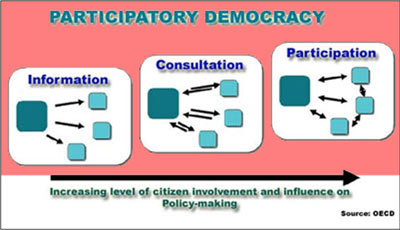For us, the publishers and staff of this magazine, Participatory democracy is a process emphasizing the broad participation (decision making) of constituents in the direction and operation of political systems. While etymological roots imply that any democracy would rely on the participation of its citizens (the Greek demos and kratos combine to suggest that "the people rule"), traditional representative democracies tend to limit citizen participation to voting, leaving actual governance to politicians. Participatory democracy strives to create opportunities for all members of a political group to make meaningful contributions to decision-making, and seeks to broaden the range of people who have access to such opportunities.
Representative democracy is not generally considered participatory but it tends to evolve by adopting participatory mechanisms and tools.

Participatory vs representative democracy
by Tina Trumbach
The recent focus on District Councils has raised for us the central difference between two forms of democracy – participatory and representative.
District Councils can be seen as a form of participatory, or direct, democracy that brings greater decision making power directly to the people themselves.
Participatory democracy can be defined as a form of government which emphasises the broad participation of constituents in political systems and which creates opportunities for all members of a population to make contributions to decision-making.
Participatory democracy tends to advocate more direct forms of citizen participation and greater political representation than traditional representative democracy.
Representative democracy is the predominant form of democracy, and is founded on the principle of elected officials representing a group of people. All modern Western-style democracies are types of representative democracies – including the USA and the United Kingdom.
Representative democracy is often seen as the only form of democracy possible in mass societies, and was born in the 18th century with the French and American revolutions. It is a system in which people elect their lawmakers (representatives), who are then held accountable to them for their activity within government.
By contrast, participatory democracy (also known as direct democracy) puts policy decisions directly in the hands of the people. To date, there isn’t a country in the world that could be properly defined as a comprehensive participatory democracy. However, there are examples of participatory government within larger representative systems. For example, referendum voting is an example of participatory democracy in action.
In practice, participatory democracy finds its strengths in smaller settings – such as District Councils.
In Cayman, we have a representative democracy modeled on the Westminster system of government. We vote for our elected representatives to govern with the mandate of the people. However, we also have a District Council Law which governs the creation of district councils.
At present, the law calls for councils that are appointed and with only advisory power.
Some of our lawmakers want to change this. Last year, North Side MLA Ezzard Miller sought to change the District Council Law to make the councils elected bodies with decision making power. While his motion was accepted by the government, Premier Hon Alden McLaughlin delayed its implementation until after the May 2017 General Elections.
Bodden Town MLA Alva Suckoo has announced his intention to bring the issue back to the Legislative Assembly with a similar motion of his own, seeking quicker action.
We have a law that establishes the district councils but the membership is appointed by Cabinet,” Mr Suckoo stated.
“If we want to be truly democratic in our approach we would have that membership appointed through a local election in each constituency, where the district council that works with the representatives (MLAs) is not just appointed. Because political appointment is just one thing but it can muddy the water so to speak because the government- they can appoint whoever they want. It would be much better to have an elected membership or at least majority of the members elected rather than appointed,” he added.
We think that the use of participatory democracy in a society as small as Cayman’s is a positive thing. We have seen the use of a referendum in the past, to ratify the 2009 Constitution. We have also seen a referendum on One Man One Vote.
We have also seen in some cases how our representatives’ actions and decisions have become further removed from the views of the people they serve and represent. District Councils may serve to bridge this gap.
Only two districts currently have functioning District Councils. One is in West Bay and the other is in North Side.
In an interview last month with The Cayman Reporter, Mr Miller noted that the North Side District Council was established prior to the District Council Law, and is elected rather than appointed.
The North Side MLA said he is a proponent of participatory democracy ...
[ Full text ]
Comments powered by CComment